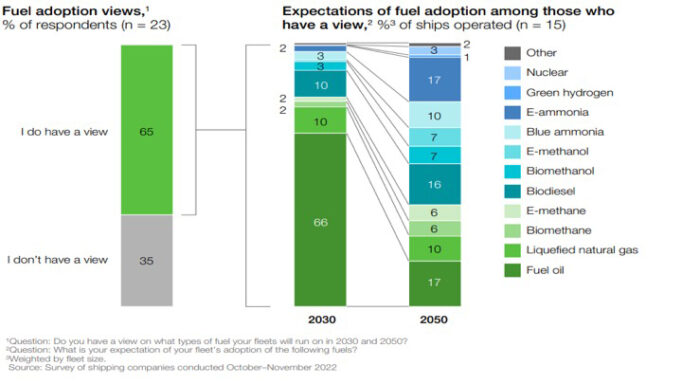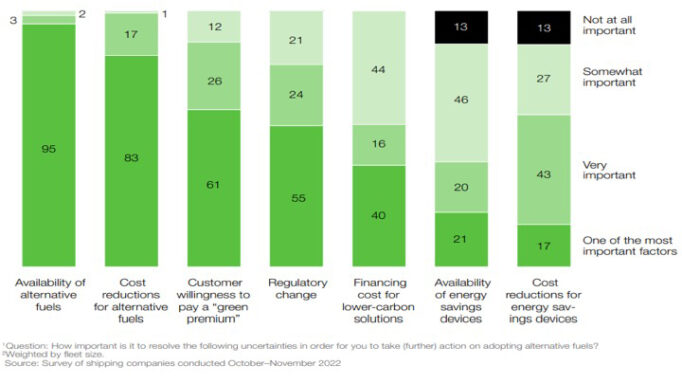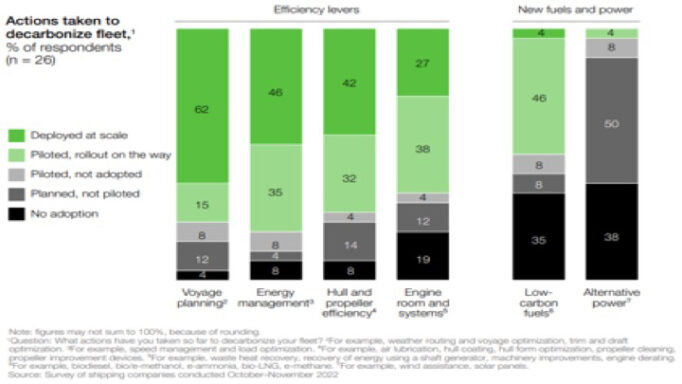Global Maritime Forum (GMF) released a study in which a multi-fuel future for the shipping industry on the path to zero emissions is evaluated. To understand how shipping industry leaders are thinking about future fuels and what their plans and projections are to adopt cleaner fuels and efficiency-boosting technologies, the Global Maritime Forum, the Global Centre for Maritime Decarbonization, and the Mærsk Mc Kinney Møller Center for Zero Carbon Shipping conducted a survey of major shipping companies, with analytical support by McKinsey & Company.
Surveys like this play a crucial role to inform the industry and public, and support shipping’s transition to a zero-emissions future …said Professor Lynn Loo, CEO of the Global Centre for Maritime Decarbonization.
The most striking result from the survey is a multi-fuel future: the need to prepare for fleets operating on three or more fuel ’’families.’’ The most common mix by 2050 represented by 4% of respondents is a fleet concurrently running vessels on fuel oil/biodiesel, methane, methanol, and ammonia—a step-change in fuel diversity.
Two-thirds of shipping company respondents have views on what their fuel usage will look like in 2030 and 2050, although expectations vary:

Photo Credit: GMF
The industry will need to think strategically about how to operate multi-fuel fleets and green fuels must be introduced in a safe and cost-efficient manner to make them the preferred alternative to current petroleum products.
… said Bo Cerup-Simonsen, CEO of the Mærsk Mc-Kinney Møller Center for Zero Carbon Shipping
Other findings from the survey suggest that internal combustion engines will remain the preferred technology through 2050, and that the speed of shipping industry’s adoption of alternative fuels will be a function of the cost gap with fossil fuels and the degree of availability of such greener alternatives at ports worldwide.
Fuel availability and cost, customer willingness to pay, and regulatory change are top priorities for shipping companies.

Photo Credit: GMF
Shipping companies should strongly consider doing more to encourage among their customers a greater willingness to pay for green shipping services. More transparency about the life cycle greenhouse-gas footprint of different fuels might help give customers confidence to pay for greener services, potentially paired with a “book and claim” system to ensure integrity, the report highlights.
- Fuel producers. Future fuel scenarios will be determined by both the demand side and the supply side. Choices made by fuel providers will play a major role.
- Ports (and the bunkering companies that operate within them). Ports and bunkering providers might prioritize making individual fuels available in the near term—due to the existence of nearby production facilities, participation in green corridors that require use of particular fuels, or national decarbonization plans and incentives. But in the longer-term, ports that wish to attract the greatest possible number of future vessels should prepare for the need to offer multiple fuel types.
- Policy makers and regulators. The single most important factor in fuel choice will likely be the rate of decarbonization required by regulators. Policymakers and regulators can help close the cost gap between green fuels and fossil fuels and create a “level playing field” for all shipping companies to accelerate their adoption of green fuels.
The role of regulators will be crucial in this process, in particular the outcome of the ongoing negotiations at the IMO
… said Johannah Christensen, CEO of the Global Maritime Forum.
Shipping companies report widespread adoption of efficiency levers, but few have taken actions to adopt new fuels and alternative power systems.

Photo Credit: GMF
The companies surveyed roughly represent twenty per cent of the world’s total fleet capacity; they own and operate container ships, tankers, dry bulkers, gas carriers, car carriers, cruise ships, tugs, and offshore vessels. The survey paints a multi-fuel picture of the industry that is striking. The onus is on each shipping company to develop its own proprietary view of its future fuel mix in line with its business strategy and decarbonization ambitions.
To reach a zero-emissions future, the industry needs a more ambitious regulatory framework with clear reduction targets and supporting policies to close the cost gap between green fuels and the fossil fuels that currently power the global fleet.
Reprinted with permission.